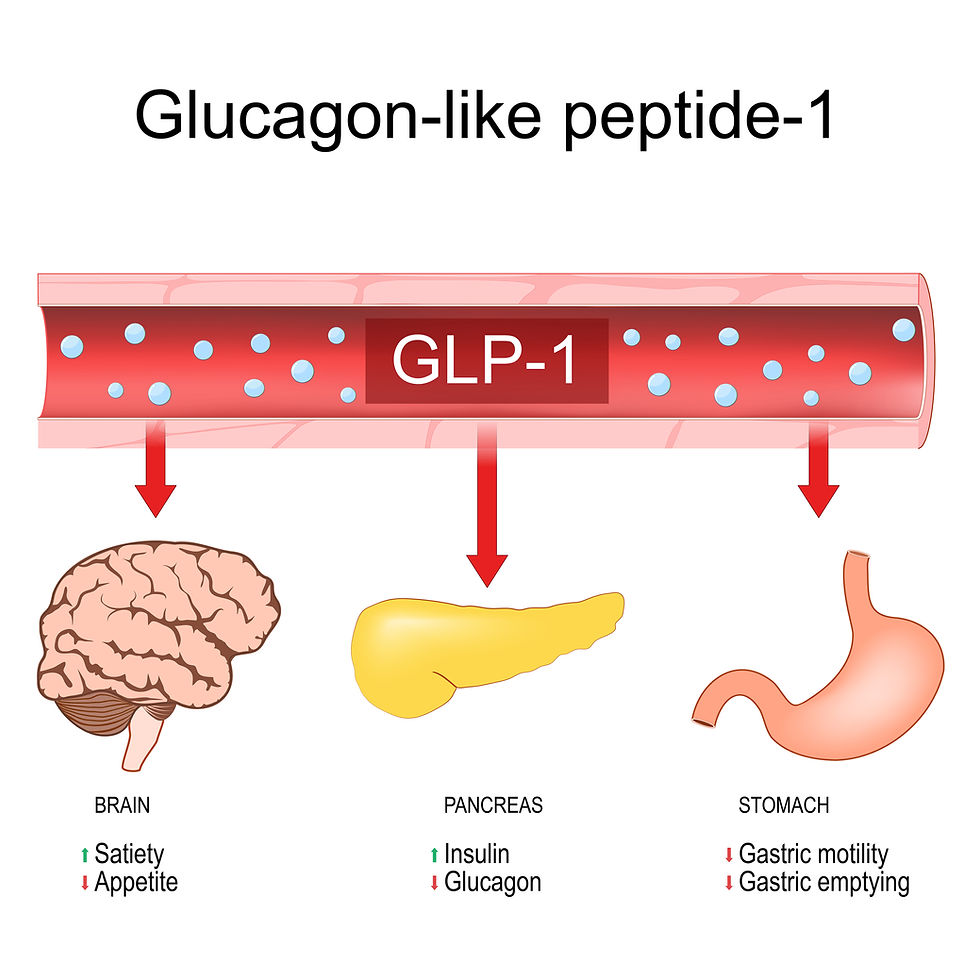Struggling to lose weight, feeling tired, cold and low in energy??
- Julie Hodgson
- Nov 6, 2020
- 5 min read
Updated: Feb 21, 2024
Maybe it's your thyroid! Even if you've had normal test results!

The thyroid is a little butterfly shaped gland that sits just under the voice box in front of the trachea.
It’s another powerful little gland with an important role in the body! If you think of the body as the orchestra, the thyroid is the conductor in that it helps keep pace in the body.
It directly influences the metabolism of our cells, knowing when things need to slow down or pick up speed.
If too much of the thyroid hormones are secreted, the body cells work faster than normal, so causes symptoms of increased activity, and may lead to a faster heart rate, or increased digestive activity, so that you have more frequent bowel movements, or even diarrhoea.
If there is too little thyroid hormone, the cells and organs of the body slow down. Heart rate may be slower than normal, and your digestion sluggish, so you become constipated. It also slows metabolism.
A very simple overview of how the thyroid works; You can skip this bit if you like :)
---------------------------------------------------------------
Thyroid hormone production works on what’s known as a feedback loop. When the body requires more thyroid hormones, it signals the Hypothalamus in the brain, which then tells the Pituitary gland, another little gland in the brain, to produce a hormone called Thyroid Stimulating Hormone (TSH).
If more thyroid hormone is required by the body, more TSH is released. If less is required less TSH is released.
A High level of TSH on a test indicates an underactive thyroid. That's because your pituitary produces more TSH in an effort to stimulate your thyroid gland into producing more thyroid hormone.
A Low level of TSH indicates a hyperactive thyroid. Too much thyroid hormone in circulation.
The release of TSH from the Pituatary gland stimulates the thyroid to synthesise, and then release the hormone thyroxine. Also known as T4.
T4 then travels via the blood stream to where it’s converted, mainly in the liver, into an active form known as T3. T3 is actually 4 times more potent than T4.
T3 then gets taken to every cell in the body where it enables all the metabolic processes we need to happen for the body to function properly.
-------------------------------------------------------------
“The British Thyroid foundation state that 1 in 20 people suffer from a thyroid condition, and many go undiagnosed”.
An underactive thyroid, which I’m going to concentrate on here, is a very common condition, especially in women of a certain age, where it is actually 10 times more common.
Symptoms of an underactive thyroid include;
- Fatigue
-Weakness
- Weight gain or increased difficulty losing weight
- Coarse, dry hair
- Dry, rough pale skin
- Hair loss
- Cold intolerance (you can't tolerate cold temperatures like those around you)
- Muscle cramps and frequent muscle aches
- Constipation
- Depression
- Irritability
- Memory loss
- Abnormal menstrual cycles
- Decreased libido
- Raynauds like symptoms
If you’ve had an underactive thyroid diagnosis, knowing the reason can help you address the symptoms. Also, if you think you have the symptoms, but have had the all clear, or you have been told your tests are fine, it’s worth exploring a bit deeper with a full thyroid panel that looks at not only TSH and T4, but T3, RT3 and antibodies.
This can help you ascertain the reason you are getting thyroid symptoms. For example, it is handy to know if you are converting T4 to T3 adequately, or maybe you are producing too much reverse T3, discussed below, or maybe you have antibodies on your thyroid.
"With all the controversy around testing, you should really consider an individuals presenting symptoms, instead of just relying on a 'one-sized fits all' reference range."
Some of the underlying causes of a low thyroid include;
- Nutrient deficiencies - Low iron, iodine, zinc, selenium, B vits, vitamin c, protein.
- Inflammation – Autoimmunity – Hashimoto’s – Graves disease
- Stress (too much cortisol, not enough cortisol)
- Underlying imbalances such as a dysbiosis of your gut microbiome – The type of bacteria is shown to impact on conversion of the inactive T4 to the active T3.
- Too much reverse T3 in circulation - Reverse T3 is a natural by-product of thyroid hormone conversion and helps regulate the process maintaining homeostasis. It can however, become a problem when too much is produced and blocks T3 from doing it's job. It is produced in response to physiological stressors such as extreme dieting, a very low carbohydrate diet, stress, or inflammation.
Some main considerations to help bring the thyroid back into balance and reduce your symptoms.
- Improve stress management
- Optimise nutrients for thyroid hormone production and for the conversion of T4 into T3. It is worth testing to ascertain your current levels of these nutrients, adding them in through diet and supplementation.
- Support cell membranes to improve hormone sensitivity. Omega 3s, healthy fats and lowering trans-fats and processed, oxidized fats.
- Reduce inflammation – bring the immune system back in balance. Avoidance of inflammatory triggers and an anti-inflammatory diet and lifestyle.
- Address underlying imbalances such as digestive issues.
Nutrients needed for the production of thyroid hormones include;
Protein – (Tyrosine) – Building block of T4.
Magnesium – Deficiency increases stress - leafy greens, pumpkin seeds, broccoli, nuts and seeds
Iodine – Main component of T4 and T3. – shellfish, seaweeds, eggs, meat. *****:**(****Supplementation of iodine is not recommend in autoimmunity which accounts for 90% of hypothyroidism****)
Iron – Needed for the synthesis of T4 - Heam iron (red meat, liver, oily fish, eggs) non-heam iron (beans, pulses, dark leafy veg).
Zinc – involved in thyroid function and T3 cell receptors - Beans, lentils, nuts, seeds
Selenium – Co factor needed for conversion of T4 into T3 – Meat, fish, eggs, brazil nuts
B vitamins – needed for thyroid hormone production.
Essential Fatty Acids – Healthy cell membranes and receptors to allow hormone to pass through.
A large amount of people with low thyroid function have what is known as Hashimotos, an autoimmune condition where your immune system is attacking the thyroid.
In this case, supporting the immune system can help relieve thyroid symptoms. It’s possible to bring the immune system back in balance through the avoidance of inflammatory triggers, and an anti-inflammatory diet and lifestyle.
There is also an association between coeliac disease and autoimmune thyroid disease.
While not everyone with thyroid disease, or autoimmunity is affected by gluten, gluten is implicated in the development of what’s known as intestinal permeability, which in genetically susceptible individuals may lead to autoimmune conditions.
*****Quite a long one, but I hope this has helped you understand the Thyroid. As usual if you have any questions or need any support be sure to get in touch. xx
These are also some good resources that might help further;
Dr Barry Peatfield – The great Thyroid scandal
Thyroid Uk – Thyroiduk.org
Dr Myhill – Drmyhill.co.uk
Paul Robinson - The thyroid patient's manual: Recovering from hypothyroidism from start to finish
Izabella Wentz – thyroidpharmacist.com - The Hashimoto's protocol
www.medichecks.com/thyroid-health - thyroid testing
Julie x
Helping you live a healthier, happier life Julie Hodgson BSc (Hons), PgDip, DIP ION, mBANT CNHC registered Nutritionist & Health Coach 1-2-1 Health & Well being consultations and packages E. juliehodgsonnutrition@gmail.com www.julie-hodgson.com www.facebook.com/juliehodgsonnutrition T. 07971 862324





Comments